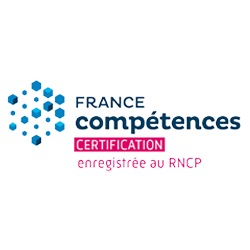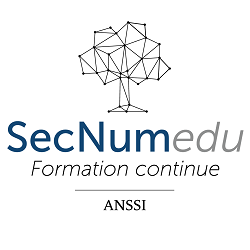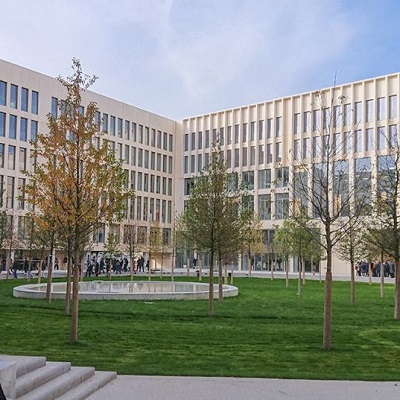Advanced Master’s in Cybersecurity
This Advanced Master program is taught 75% in French and 25% in English.
RNCP Level 7 Degree - No. 36855: “Network and Systems Security Governance Expert (MS)”
Operators of Essential Services (OES) are dependent on networks or information systems that provide services required for the economy or society to function.
This includes several sectors: energy (electricity, oil, gas,) transport, logistics, finance, insurance, social services, employment and vocational training, education, health, water management, food service and of course telecommunications.



Presentation of the program
A graduate’s story
| Start of the next academic year: | September 15, 2025 |
| Registration opens: | October 30, 2024 |
| Additional information: | • This postgraduate program is a shared time experience includes an in-company application assignment • The course can be completed as a student (continuing or resuming studies), as a continuing education trainee or on a work-study basis. • Most of the course is taught in French (75%), but some modules are taught in English (25%). |
The objectives of the program
This program aims to meet companies’ requirements for security governance through a comprehensive approach covering all aspects of cybersecurity, including the technical, methodological, organizational and regulatory issues.
This Advanced Master’s teaches you the skills you need to develop and implement a security plan designed to protect companies’ vital resources from internal and external attacks.
These skills include the following:
- Analyze and address specific cybersecurity issues that affect Operators of Essential Services or their partners
- Lead a cybersecurity project
- Analyze network threats and security mechanisms
- Analyze vulnerabilities and safeguard IT applications
- Audit an information system
- Deploy authentication, encryption and privacy services for an information system
| Target careers: | • Information Systems Security Auditor - IT environments • Security Expert for IT Systems and Environments • Cybersecurity Consultant (or Security Consultant) • Security Assessor • Security Architect • Computer Network Security - Computer Network System Engineer • Security Expert for Information and Communication Technologies • Security Manager for Information/Computer Systems • Cyber Defense Center Manager • Head of IT and/or Business Project Security • Security Operations Center (SOC) Manager |
| This Advanced Master’s degree is intended for: | • Operators of essential services (OES) professionals seeking training in cybersecurity; • IT professionals wishing to train in cybersecurity for OES; • Cybersecurity professionals seeking OES-specific training; • New computer science graduates seeking training in cybersecurity (see admission procedures). |
| Prerequisites: | • Good basic knowledge of systems and networks, • Proficiency in French and technical English (courses and assessments are in English), • An engineering degree or five year-degree (Master’s, DEA, DESS) in the field of computer science or related field, or a lower degree supplemented by solid professional experience (see our Admission requirements for more information) |
Cybersecurity is now a key issue for our modern societies. In light of the development of new technologies (Cloud, Big Data, Internet of Things) and vectors of attack, companies must have security specialists and experts who can protect their sensitive information and monitor changing threats and vulnerabilities.
The need for people trained in this area is increasing due to the changes in European regulations (NIS Directive), which now require operators of essential services to implement security measures for their information systems. This program is intended for the current and future staff of these operators in particular.
The program
The Advanced Master’s in System and Network Security program was redesigned in 2020 to take into account the recent rapid development of the cybersecurity ecosystem.
One of the main reasons for this development was the implementation of the new European Network and Information System Security (NIS) regulation. France implemented this directive in 2018, thus introducing new obligations for operators of essential services and their partners.
The MS in Cybersecurity for Operators of Essential Services aims to support and assist the growing number of companies facing this new need.
The program’s specific features:
- integration of all aspects of cybersecurity (technical, regulatory, operational);
- stakeholders from various backgrounds: academic, industrial, those involved in State organizations;
- an emphasis on practice and projects;
- A team of recognized faculty in the field of
cybersecurity (see the teaching team)
The program is divided into two stages:
- A 8 months part-time (1 week out of 3), from mid-September 2025 to end-April 2026
- A 5–6-month full-time corporate assignment starting in May 2026

Duration: 7 months
The academic curriculum is divided into two parts:
- The technical foundations of cybersecurity: 660 hours (risk assessment, attack detection, authentication, VPN and encryption, filtering, application and service security)
- Advanced operational skills applied to OES: 575 hours (cybersecurity of industrial systems, legal and regulatory aspects of cybersecurity, projects, conferences)
This course alternates lectures with practical work, small group projects and individual and group work in the field of cybersecurity.
Duration: 5-6 months
The corporate assignment is mandatory and runs a minimum of 5 months full time (minimum of 760 hours)
Students will then write and defend a professional thesis in the form of a report summarizing the work they carried out for the assignment in a detailed and organized manner (about 90 hours).
Students receive in-person and remote tutoring sessions throughout the program.
The teaching team
Head of the Advanced Master’s program
Christophe Kiennert
Associate Professor in Cybersecurity at Telecom SudParis
Email: @christophe.kiennert
As a graduate of Telecom Paris, Christophe Kiennert first worked on issues related to digital identity and secure microcontrollers. He now researches decision support and optimization as applied to cybersecurity. He is involved in several European projects on various aspects of cybersecurity, ranging from the development of a secure platform for remote assessment (TeSLA), to the development of a decision support platform for the automated deployment of countermeasures in the event of an attack (SOCCRATES).
Deputy Head of the Advanced Master’s program:
Olivier Levillain
Associate Professor in Information Systems Security at Telecom SudParis
Olivier Levillain was in charge of the information systems security training center for the French cybersecurity agency (ANSSI).
He has also worked at the laboratories of ANSSI's expertise division on various topics ranging from attacks on low-level hardware mechanisms to key management infrastructure.
His recent work focuses on secure network protocols (particularly SSL/TLS) and programming languages (JavaSec and LaFoSec studies, Mind your Languages presentation).
The programs are taught by faculty from various backgrounds to combine academic excellence with professional practice: research professors, individuals involved in State organizations and experts from the corporate world.
The research professors involved in the Advanced Master are cybersecurity experts from the Telecom Networks and Services department at Telecom SudParis. They are conducting research in the following areas:
- TeSLA(e-learning): an e-learning project aimed at developing a secure platform for remote assessments
- SOCCRATES(Incident Response): Cybersecurity project to develop a decision support platform for the automated deployment of countermeasures in the event of an attack.
- PRESTO: Processing of encrypted streams for security applications.
- VARIoT (Internet of Things): Cybersecurity project aimed at creating a vulnerabilities database that is readily available for the Internet of things.
- EUNITY(non-technical): Coordination project to analyze the differences and links between Europe and Japan in the field of cybersecurity, with the aim of fostering future collaboration in research projects.
- GASP: Tools for a generic approach to the implementation of complex network protocols.
External contributors are actively involved with recognized organizations and companies in the sector, including:
• ANSSI • Advens • Amazon • Manika • the Treep • Wavestone • i-Tracing
Graduation
The “Network and Systems Security Governance Expert (MS)” degree is:
- registered with the Frances Compétences directory of professional certifications under the number RNCP36855
- An Advanced Master’s by the Conference des Grandes Écoles
Students must successfully complete each of the six skill units included in the program order to graduate:
- unit 1: Analyze and address specific cybersecurity issues that affect Operators of Essential Services
- unit 2: Lead a cybersecurity project
- unit 3: Analyze network threats and security mechanisms
- unit 4: Analyze vulnerabilities and safeguard IT applications
- unit 5: Audit an information system
- unit 6: Deploy authentication, encryption and privacy services for an information system
- Professional thesis: completion of a cybersecurity assignment for a company, writing and defending a professional thesis on the assignment completed
Please see our Accreditation of Prior Learning page for more information on earning a degree or certain skill units through the accreditation of prior learning process.
→ See the France Compétences website for more information.
Admission requirements
French or foreign individuals who meet the following criteria may apply:
- Sufficient proficiency in French and English,
- Good basic knowledge of systems and networks,
- Meet the general or exceptional entry requirements listed below,
Applications from individuals who have earned one of the following degrees in computer science or a related field will be eligible:
- Engineering degree accredited by the Commission des Titres d’Ingénieur (CTI list)
- Business school degree from an accredited French national Master’s degree program (CEFDG list)
- Postgraduate degree accredited by university authorities (DEA, DESS, Master’s) or a five-year professional degree
- M1 or equivalent degree for auditors with at least three years of professional experience.
-Degree registered as RNCP level 7(formerly classified as level I)
-Foreign degree equivalent to the French degrees listed above.
We will equate older degrees which are no longer awarded with those that have replaced them, if applicable.
a) Up to a maximum of 40% of the class for in the Advanced Master’s program in question may be admissible after completing an Accreditation of Personal and Professional Experience procedure for applicants with a minimum of 5 years of professional experience which can be proven to relate to professional skills covered by the program (excluding internships, gap years and initial work-study programs).
For this admission pathway, a description of the Accreditation of Personal and Professional Experience procedure with information enabling an assessment of the applicant’s knowledge, methods and expertise must be provided, including the composition of the teaching commission and any components of the procedure that are relevant to the program.
b) By way of derogation, for a maximum of 30% students in the Advanced Master’s program in question, applications from students who have earned one of the following degrees in computer science or a related field will be eligible:
- Level M1 successfully completed or equivalent without professional experience
- L3 degree with proof of at least three years of relevant experience
The total percentage of the derogations provided for in (a) and (b) above may not exceed 40%.
An admission board is in charge of selecting applicants in several stages:
1/ Application review: verification of the degree requirements and content of the initial training and/or nature of the professional experience.
2/ Online test: verification of the prerequisites for the program.
3/ Interview: applicants who pass the test will be invited to an interview with a director of studies.
Applicants who are currently completing their studies and have not yet received their final diploma may be admitted subject to the presentation of a certificate of achievement or diploma prior to their administrative registration.
For the 2023-2024 academic year:
- €8,000 for individual applicants, students and job seekers.
- €15,000 for applicants presented by a company.
Any program started will be due in its entirety.
Prices are net of taxes and subject to a contract or training agreement.
The contractual conditions are included in the financial appendix attached to the application.
This program is eligible for funding by the French professional training fund, CPF.
Funding solutions are available: Find out more
How to register
1/ Submit your application
Opening of applications: October 30, 2024.
- Click the link below to request an application.
- Submit it by email
only complete files will be reviewed
2/ Follow the admissions procedure
- Take the online test to confirm your level
Telecom SudParis will send you the connection link - Attend the interview with a Director of Studies
Telecom SudParis will make your appointment by phone or videoconference - The admission board will meet and communicate the list of eligible applicants
Meetings of the admission board are scheduled each month, from January to June 2025. The admission board will meet for a final session during the summer of 2025 to rule on specific cases. - You will then receive an eligibility certificate.
3/ Confirm your arrival and prepare your registration
- Sign your training contract and pay the first deposit on your tuition.
- If necessary: book your accommodation and apply for your visa
4/ Complete your administrative registration
- Finalize your administrative formalities
- You will receive your registration certificate and your notification letter
5/ Start the program
Start of the academic year: September 22, 2025, on the Evry campus
We advise international students to start the necessary procedures as soon as applications are opened (campus France procedure, visa application, accommodation with a longer wait period).
Please note: on-campus housing is limited in number. Please be sure to apply very early if you want to live on campus at the Maisel Student Residence. You will find a list of other possible accommodations in your application file.
International students must also check if they are required to file a request with Campus France: https://www.campusfrance.org/fr/faq/quels-sont-les-pays-relevant-de-la-procedure-etudes-en-france






